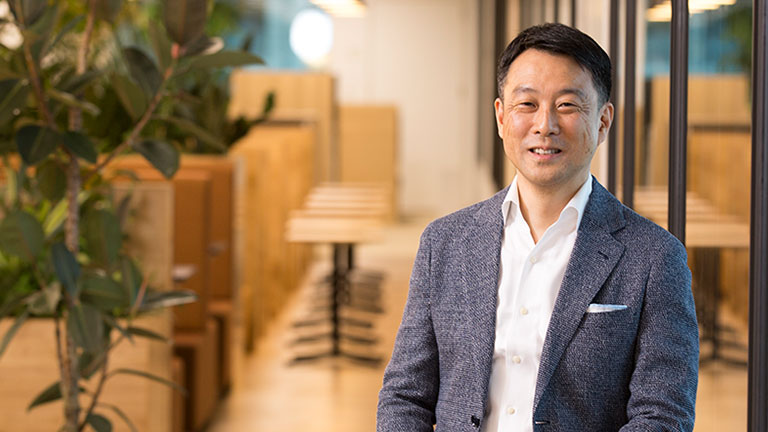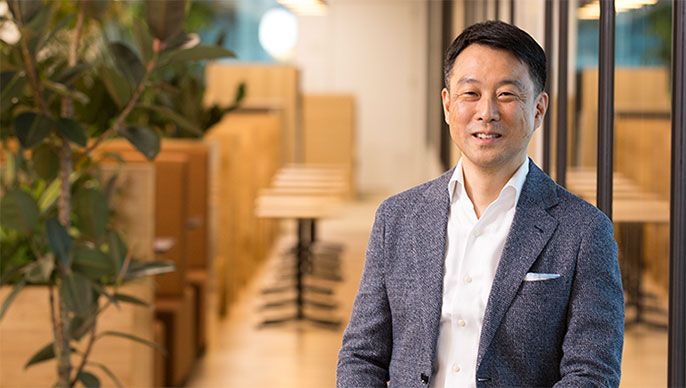CDIO Message


Leading Digital Transformation
through Inclusion that Maximizes
the Power of Each Individual
Representative Director,
Senior Executive Managing Officer,
Chief Digital Information Officer
Toru Matsui
What is the mission of the CDIO?
The CDIO’s mission is to lead the digital-enabled transformation of Mitsui Group. Since change cannot be brought about by any one individual, it is important to communicate the management’s commitment and empower our people to initiate and accelerate change. We intend to make serious efforts in two areas of digital transformation. The first is shifting to high-value-added work through streamlining and standardization of tasks. The second is creating new businesses.
What core experiences led you to your current leadership style?
I have been seconded to four companies over a total of about 12 years, and experienced a variety of organizations. From this experience, I have come to realize that the most powerful form of organization is a group of people capable of taking initiatives. My leadership style is delegation-based, in that each individual is given a role rather than a task, and I believe it is important for all of our people to think for themselves and perform within their roles.
I also have extensive experience in launching new organizations and new businesses, including the establishment of a shale gas project company and the Energy Solutions Business Unit. This experience has led me to reject conventionalism. The strength of our people is that they do not follow established precedents, but instead use their own ideas to think about what is best in the current environment and what is in the best interests of the company. I believe that the role of leaders is to draw out this ability.
How much progress was made in terms of digital initiatives under Medium-term Management Plan 2023?
We have been promoting digital transformation (DX) since 2017. In April 2020, at the start of Medium-term Management Plan 2023, the Digital Transformation Team which was part of the Corporate Planning & Strategy Division and the Information Technology Promotion Division (at that time), were merged into the Integrated Digital Strategy Division, which assumed the responsibility for both seeking out new opportunities and enhancing existing businesses though DX.
In the fiscal year ended March 2021, we formulated the Digital Transformation Comprehensive Strategy as the Group’s vision for DX, in addition to a roadmap for its implementation. As of the end of the fiscal year ended March 2023, a cumulative total of approximately 350 DX projects have undergone consideration, of which about 95 were trialed or began system development, and about 45 were implemented or are in actual operation. These numbers indicate steady progress.
In addition, we have introduced the Strategic DX Support Program to support projects that are technically challenging or are difficult for a business unit to tackle on its own, but which we should undertake as a company from a medium- to long-term strategic perspective. Leveraging this program, we have fostered businesses that use digital technologies to provide real solutions to social issues, such as Forest DX, as well as T2’s trunk line transportation service that uses Level 4 autonomous driving technology, and farmers 360° link, which tracks the supply chain of sustainable cotton. In June 2023, we were selected under the DX Stocks 2023 program operated by the Japanese Ministry of Economy, Trade and Industry and other organizations, in recognition of our management policy and implementation system that is integrated with our sustainability strategy.
What are your goals under Medium-term Management Plan 2026?
Our first goal is to utilize DX to carry out larger tasks with our current headcount, as put forward in Corporate Strategy (4) Strengthening of Group management capability, under Medium-term Management Plan 2026. To achieve this, it is essential to shift to high-value-added work through the use of digital technology to improve operational efficiency. We would also like to fully share expertise and other information from each business unit and apply it to the creation of new businesses. For this reason, it is important that all of our people continue to reskill.
According to a survey by the International Institute for Management Development, Japan’s competitiveness is declining. Thorough streamlining of routine tasks through DX is urgently required to increase business efficiency. To this end, we are working to improve the DX literacy of our people, who are already well-versed in the business world, and to increase our organizational DX capabilities through the application of related skills.
I believe that reskilling is a natural part of Mitsui’s culture. Because of how we make changes to our business models in response to the social issues of the times, as well as the level of collaboration and personnel movement between business units, we are able to constantly update essential knowledge with regard to industries, logistics and trading, and business investment. It is safe to say that reskilling has become a habit because without it we would be unable to perform our roles. We have a variety of digital tools and infrastructure at our disposal, so we are encouraging our people to reskill to improve efficiency by getting the most out of these tools, as well as to nurture DX Business Professional and DX Technology Professional certification. These measures are supported by the Mitsui DX Academy program and the DX Talent Recognition System. As CDIO, I am committed to encourage the promotion of the above initiatives.
Our second goal is data-driven management. We will endeavor to promote data-driven decision-making. Our “Bloom” talent management system is an important example. Our people are the source of our value creation. We will seek to understand our human resources on a global basis through Bloom, and to use this data to promote the strategic allocation of the best people to their best fit positions, thereby further accelerating our value creation.
Our third goal is to create businesses that leverage digital transformation. We are creating businesses by combining digital technology with Mitsui’s unique expertise. For example, with Forest DX we obtained approval for an emissions credit generation project that utilizes aerial survey data to visualize the CO2 absorption of Company-owned forests. In the past, only physical measurements of CO2 absorption were accepted when calculating emissions credits. However, our digital technology for taking these measurements was the basis for the Japanese government to make regulatory changes. This is just one example of the results made possible through the use of digital technologies. In this way, we will continue taking on the challenge of creating new businesses by combining our expertise and management capabilities with digital technology.
What is important in order to achieve a digital-enabled transformation?
Inclusion—this is what makes it possible for a diverse workforce to thrive. From my experiences with being seconded to various companies, I recognize the importance of having people with diverse backgrounds performing with the feeling that they are each an essential part of the organization. For example, when I was the only Japanese person in a conversation with Australian colleagues and the topic of an Australian Football player came up, someone would explain a bit of background to me so that I would not feel left out. These kinds of small considerations are important to help people understand what they might not otherwise. To me, that is the very essence of inclusion.
I was responsible for the launch of the Energy Solutions Business Unit, which was formed by bringing together people from a few other business units. For that reason, I made sure that the phrase “make others successful” was ingrained in all members of the business unit. As the hub for promoting energy transition in collaboration with other business units, this phrase tied the unit together as an organization with a common understanding of the need to lead the other business units to success.
Inclusion is important for digital-enabled transformation. That is, inclusion of all of our people, regardless of their level of digital knowledge, as well as for maximizing the power of highly diverse DX talent from various business units and mid-career recruits. I intend to lead our company-wide digital transformation with a team spirit to bring about change in both our pursuit for new businesses and enhancement of existing businesses.